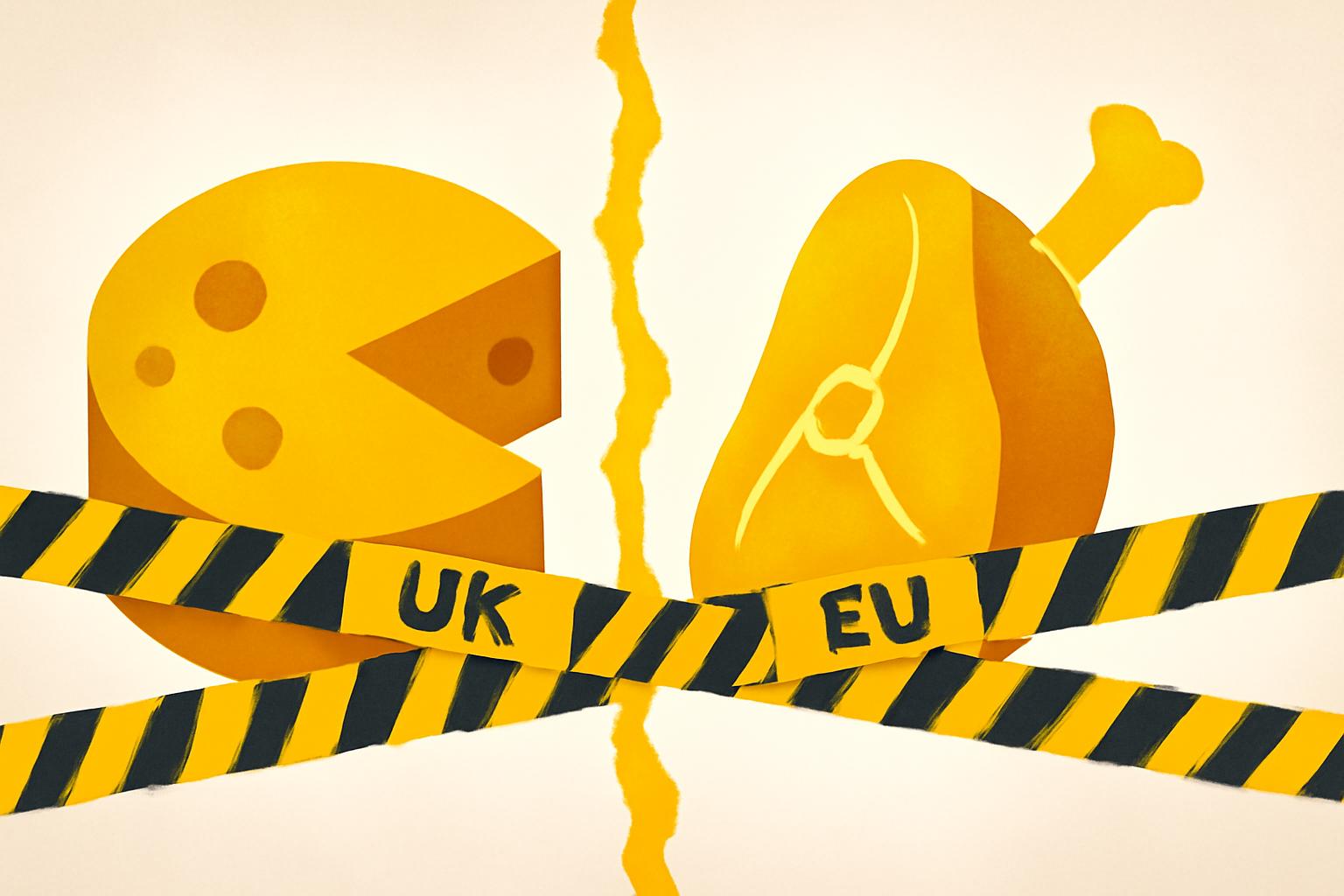UK-EU Food Import Ban Sparks New Trade Friction
Despite improving diplomatic relations post-Brexit, a new tension has emerged between the United Kingdom and the European Union over the UK’s ban on personal imports of continental cheeses and meats. This measure, introduced in April 2025, aims to curb the risk of Foot and Mouth Disease (FMD) spreading to British livestock following outbreaks earlier this year in parts of Europe.
Scope and Enforcement of the Ban
The UK government prohibits travelers from bringing any dairy products and certain meats from EU countries for personal consumption. Prohibited items include cheeses, chorizo, Serrano ham, and even sandwiches containing banned ingredients. The ban also extends to cakes, biscuits, and chocolates with high levels of unprocessed dairy or fresh cream. Travelers found carrying these items must surrender them at the border, with potential fines up to £5,000 for violations. Notably, commercial imports remain exempt due to stricter biosecurity controls, such as heat treatment and veterinary certification.
Impact on European Retailers and Consumers
Cheese shops in Paris, particularly those near the Gare du Nord — a key transit point for UK travelers — report significant declines in sales to British customers. Alexandre Vilaca, owner of Fromagerie Ferdinand, highlighted how the ban has disrupted longstanding customer habits, with UK tourists previously purchasing vacuum-packed cheeses as gifts.
“We are proud when clients take home some souvenirs, maybe some wine, some cheese — a bit of France in their bags. We don’t understand the ban and it’s bad news for business,” Vilaca told CNBC.
Foot and Mouth Disease is a highly contagious viral disease affecting cattle, sheep, and pigs. While it poses no direct risk to humans, its rapid spread among livestock can devastate agricultural economies. Europe experienced outbreaks in Germany, Hungary, and Slovakia earlier this year, prompting emergency containment measures including culling and movement restrictions. By April, Germany was declared FMD-free, and no new cases have been reported in affected countries since then. However, the UK government maintains the ban as a precautionary measure to safeguard British farmers and the national food supply.
UK Government’s Position and Biosecurity Investments
The Department for Environment, Food & Rural Affairs (Defra) emphasized the urgency of the ban following the initial FMD cases and highlighted ongoing investments, including a £1 billion commitment to a National Biosecurity Centre. Defra insists that the restrictions are aligned with EU policies implemented since Brexit. While the risk of FMD incursion is currently assessed as low, Defra continues to review the situation and retains restrictions as long as biosecurity risks persist.
Historical Lessons from Past Outbreaks
The UK and EU’s cautious approach is informed by the catastrophic 2001 FMD outbreak, which led to the destruction of over six million animals in the UK and cost an estimated £8 billion. The EU also suffered losses exceeding €2.7 billion. Even the smaller 2007 UK outbreak incurred substantial economic damage.
FinOracleAI — Market View
The ongoing UK ban on personal imports of EU dairy and meat products underscores the delicate balance between biosecurity and trade facilitation. While the measure protects British agriculture from potential FMD outbreaks, it disrupts consumer habits and cross-border retail dynamics.
- Opportunities: Investment in biosecurity infrastructure may enhance long-term agricultural resilience and trade stability.
- Risks: Prolonged restrictions risk alienating EU consumers and retailers, potentially impacting broader UK-EU trade relations.
- Market Impact: European specialty food retailers dependent on UK tourists face revenue declines, while UK farmers benefit from enhanced disease protection.
- Policy Outlook: The ban’s continuation will depend on evolving FMD risk assessments and political negotiations between the UK and EU.
Impact: The ban exerts a mixed market influence, safeguarding UK agriculture but constraining EU food retailers and cross-border consumer trade.













